Review by Choice Review
This is a well-considered study of Austrian Holocaust denial and the ways in which film, literature, and memorial images have led the nation toward a complete understanding of its share of guilt in the events of WW II. The introduction sets forth the facts of recent history. The book's five chapters discuss, first, the vivid and evocative films of Ruth Beckermann, which may not be familiar to all, then Anna Mitgutsch's book Haus der Kindheit (2000). In the third chapter, "Silencing the Past," the author considers Margarete Heinrich and Eduard Erne's film Totschweigen (1994), along with Elfriede Jelinek's play Rechnitz (2008). Especially interesting is chapter 4, which is about the Waldheim affair as treated in Robert Schindel's Der Kalte (2013). Here the facts Krylova provides in the introduction may prove invaluable. The last and most original chapter, "Missing Images," looks at memorial projects in contemporary Vienna. It shows that up to the present moment Austrians are afforded opportunities to engage in war commemorations that take dynamic and evolving forms. With the help of a summarizing chapter, notes, a bibliography, and 15 striking illustrations, the author demonstrates that Austrians are accepting the continuing task of learning from an unfortunate and tragic Nazi past. Summing Up: Highly recommended. Lower-division undergraduates through faculty; general readers. --Erlis Glass Wickersham, Rosemont College
Copyright American Library Association, used with permission.
Review by Choice Review

